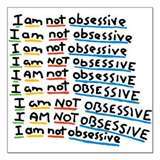OCD
Obsessive Compulsive Disorder
OCD
Obsessive Compulsive Disorder
Obsessive Compulsive Disorder (OCD) is much more common than previously thought, affecting at least 1 in 100 children and 1 in 50 adults according to the Children’s Center for OCD and Anxiety and the Obsessive Compulsive Foundation. How can you recognize OCD?

OCD is characterized by the following signs and symptoms:
Obsessions: recurrent and persistent thoughts, impulses and images that are uncomfortable and cause significant anxiety and distress.
Some common obsessions are:
fears of being contaminated
fears of causing harm to yourself or others
intrusive sexual thoughts or violent thoughts and images
symmetry: the idea that everything needs to line up or be in perfect order
superstition: excessive attention to what is lucky or unlucky
hoarding: stockpiling items which others would consider useless (i.e. old newpapers).
Compulsions: repetitive behaviors or rituals a person feels compelled to repeat over and over again. This ritual is meant to bring relief from the anxiety of the obsession but often causes more anxiety because the person feels they cannot stop. The compulsions are often very time consuming (an hour or more a day) and interfere with normal activities.
Some common compulsions are:
hand washing and cleaning
ordering/arranging
praying
hoarding
excessive double-checking
counting (even, odd numbers, stopping on a particular number)
Causes
Research shows OCD is a brain disorder. It has been described as a “brain glitch” where the brain sends false messages such as “the oven is still on” and the affected person feels a compulsion to perform rituals to shut off the voice delivering the message. OCD tends to run in families, although it doesn’t mean you will definitely develop it. Becoming a mother may cause a mild case of OCD to worsen. Illness, major life changes, and stress may create new fears and obsessions.
Screening and Diagnosis
At you or your child’s initial visit at Horizon Therapy Group, your therapist will complete a thorough assessment of the above symptoms, when they began, and the extent of the disruption it causes. They will also cover family history and current life stressors. Your therapist will be able to differentiate between OCD and other disorders, such as Obsessive Compulsive Personality Disorder (OCPD). OCPD is much different in that the compulsive behavior comes from perfectionism. From here your therapist will work with you to develop an individualized treatment plan to address OCD.
Treatment
Helpful therapies include Cognitive Therapy, Behavior Modification, and Family Therapy. A combination of behavioral therapy and medication seems to offer the best long term improvements. Mental health therapy is beneficial to help you learn how to cope with a friend or family member with OCD, especially if you live with them.
Coping Skills
Your therapist will help you learn and develop strategies to cope with OCD. Some of these are educating yourself about OCD, practicing skills at home that you have learned in therapy, decreasing social isolation, practicing relaxation skills, and joining support groups. The good news is that OCD in children and adults is highly treatable if you receive professional help and work on following your therapist’s and doctor’s recommendations.
